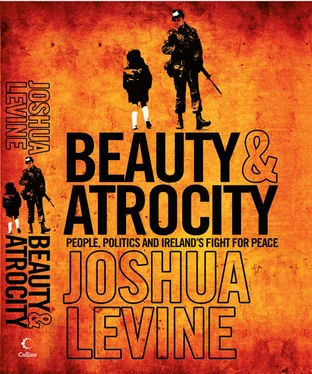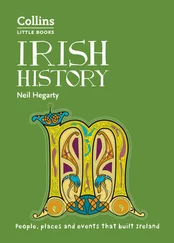We envy men of action Who sleep and wake, murder and intrigue Without being doubtful, without being haunted. And I envy the intransigence of my own Countrymen who shoot to kill and never See the victim’s face become their own Or find his motive sabotage their motives.
It is quite possible for an outsider to feel envy in the province, a place seemingly free from doubt. My own world of moral equivalence, where one is not encouraged to pass judgement on the beliefs of others, can seem, by comparison, to be a place without conviction. How fortifying it must be to have something always to believe in, and somebody always to react against. Is this what Dominic Behan wrote about in his lovely song, ‘The Patriot Game’: ‘For the love of one’s country is a terrible thing, it banishes fear with the speed of a flame, and it makes us all part of the Patriot Game’?
Now flip the coin. Perhaps Northern Ireland is a place where judgement is too readily passed. It has produced people prepared to die, prepared to cut off a hand for the cause, but not prepared to make lesser compromises. A weaker identity might produce a stronger society. One Belfast republican told me of time spent, many years previously, in Coventry. There he became friendly with a local Labour Party activist, but he could never understand how someone could be politically active in a ‘twilight city’ where nothing ever happened, where the construction of a zebra crossing was held up as a political achievement. For many in Northern Ireland, politics is not about the mundane or the consensual, it is about the struggle of identities: them and us. Why give a damn about helping kids across a road when there is an identity to preserve?
Alongside intensity of belief can sit self-importance. When a great deal of time is spent gazing inwards, it is possible to lose – or fail to gain – perspective on one’s position in the world. MacNeice again, this time seething with indignation:
I hate your grandiose airs, Your sob stuff, your laugh and your swagger, Your assumption that everyone cares Who is the king of your castle.
In a speech to the House of Commons in 1922, Winston Churchill (a member of the Liberal government team that negotiated the Anglo-Irish treaty with Michael Collins, and, according to his bodyguard, the subject of an attempted assassination by the IRA the previous year) noted that while the First World War might have overturned great empires, and altered ways of thinking across the globe, it had not changed attitudes everywhere: ‘As the deluge subsides and the waters fall short, we see the dreary steeples of Fermanagh and Tyrone emerging once again. The integrity of their quarrel is one of the few institutions that has been unaltered in the cataclysm which has swept the world.’ Churchill’s speech has often been quoted to underline the unchanging nature of Northern Irish politics. Yet it is his perception of people so unaffected by world events, so in thrall to their own reflections, that is most striking.
Seventy-nine years later Northern Ireland would gain a perspective of its position in the world. On 11 September 2001, as Al Qaeda mounted a raw and shocking attack on New York City, the Troubles were suddenly made to seem stale, predictable and petty. Blinkers fell away as all parties were forced to look beyond themselves, and to accept that men with stronger senses of identity were now commanding the world’s attention. Fewer people – in particular fewer Americans – now cared who was the king of their castle. September 11 was an attack on all that the world understood, and it shook some of the certainty and self-importance out of Northern Ireland. In its aftermath the move towards peace accelerated.
Not long after I arrived in Belfast, I met a man who told me a story. He had been sitting at home with his wife and small daughter, watching the film Schindler’s List . During a brutal camp scene the man’s wife leant across to him and whispered, ‘Is that what your prison was like?’ The man, a former member of the IRA who had planted bombs, shot at British soldiers, and served time in jail, explained that however hard prison had been for him, however brutal the screws, his treatment could not be compared to that of concentration-camp inmates. The next day, as he drove his daughter to school, the little girl asked him whether he’d really been in prison. ‘Yes.’ ‘But aren’t prisons for bad people?’ ‘Not always. You saw the film last night? Those prisoners weren’t bad people. They were put in prison by bad people. Sometimes the bad people aren’t the prisoners.’
These are the words of a father explaining his past to his daughter, but they could easily be addressed to the world at large. Over the course of this book we will encounter people who have done things that most would consider unacceptable. Some have placed morality to one side more readily than others, but how many of them now consider what they did to be wrong? Some may see their acts as having been politically motivated, in defiance of an unjust system, or in defence of their communities. These may not have been the only – or sometimes even the primary – reasons for their behaviour; they could be handy rationalizations, cynical assaults on a morally sustainable position. But they could also be sincere responses to a complex history, and they may explain why one likeable man feels able to compare his captive status, if not his actual treatment, to that of a Holocaust victim. So how should we approach men who used violence – other than with great care? Is it wrong to judge people in terms of absolutes? While a man may have committed terrible acts in certain situations , in all other areas of life he may have behaved in an entirely moral fashion. If he believes that he had right on his side, can we take him at his own estimation of himself?
We will meet those who suffered the direct consequences of these terrible acts. One man, an ex-police officer – who was himself injured in a bomb attack – told me of arriving at the scene of an explosion to find a friend and colleague lying dead. His reaction had not been one of anger or vengeance, but sadness and a sense of futility. He told me how he would have loved to bring the people responsible down to the scene, where he could ask them exactly what uniting Ireland was about .
We will meet those who never used and sometimes never endorsed violence, but who are entrenched in traditional ways of thinking: people from the Protestant tradition who consider themselves British at a time when Britishness is losing its meaning and relevance for the English, Welsh and Scots; people from Catholic backgrounds whose lives have been devoted to reuniting with the Irish Republic despite its lack of interest in reuniting with them. Slighted by their chosen partners, many of these uneasy neighbours now stand together under the umbrella of the Good Friday Agreement. What divides them unites them.
It is important to remember that the overwhelming majority of people in Northern Ireland, whether Orange or Green, did not participate in, or support, the violence of the Troubles. Yet many of them were affected by it. In 1999 researchers from the University of Ulster published the ‘Cost of the Troubles Study’, for which they had interviewed 3,000 men and women across Northern Ireland to gauge the effects of the Troubles on ordinary people. Of those interviewed, a quarter had seen people killed or injured, a fifth had experienced a deterioration in their health which they attributed to a Troubles-related trauma, and almost one in twenty had been injured in a bomb explosion or a shooting. As well as recording a large increase in alcohol consumption and the taking of medication, the study found a high level of fear of straying from one’s own area and an acute wariness of outsiders.
Читать дальше












